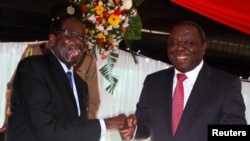HARARE —
Southern African leaders are meeting in Mozambique this weekend to discuss the upcoming Zimbabwean elections. The event is likely to be overshadowed by the controversy over the election date. Prime Minister Morgan Tsvangirai is challenging President Robert Mugabe’s decision to hold the elections on July 31, a date less than seven weeks away.
Leaders of countries in the Southern African Development Community, SADC, are finally meeting this weekend in Mozambique to discuss ground rules for the Zimbabwean elections, after postponing the summit last week.
On Thursday, President Mugabe said elections will be held on July 31. However, Prime Minister Tsvangirai, who formed a power-sharing government with Mugabe in 2009, says the president did not consult him before setting the election date.
“I instructed my attorneys to file an urgent application to deal with this matter," said Tsvangirai. "In addition, I think SADC, we are going to the summit, I think SADC has a responsibility of ensuring that they call the president to order. We hope that SADC will have a consensus and that is what I expect to be the outcome of the conference.”
Tsvangirai’s lawyer Selby Hwacha said they want Zimbabwe’s highest court to force Mugabe to revisit the election date. He says the president usurped parliamentary powers and changed the electoral law.
The prime minister and other Mugabe opponents have also demanded changes in electoral laws and laws that restrict the rights of expression and association before the elections are held. The court hearing for the case is likely to be next week, a few days after the SADC leaders’ meeting in Mozambique.
Professor Lovemore Madhuku is a senior constitutional lawyer at the University of Zimbabwe. He said it is not likely that the Zimbabwean courts will rule in favor of Tsvangirai.
He also said the SADC has no power to make Mugabe change the election date.
“These are voluntary organizations - the best they can do is to expel Zimbabwe from SADC, but not to run its affairs," said Madhuku. "You go into SADC as a sovereign country. Do you think President Mugabe will listen to SADC, that might be a better question. Not will SADC reverse. SADC will not reverse."
Earlier this week, Pedzisai Ruhanya, a media and democracy doctorate student at University of Westminster in Britain, said this election could plunge Zimbabwe into a fresh political crisis unless SADC quickly moves in and ensure a credible election.
“It is possible for SADC to immediately deploy its observers, for AU to immediately deploy its observers," said Ruhanya. "They have to deploy their people now, to monitor the registration process, to monitor the political environment before we go into a hotly disputed electoral outcome.”
Zimbabwe's last elections in 2008 were marred by widespread violence, most of it by Mugabe supporters against perceived opponents. The elections were widely condemned as unfair and resulting in SADC pressuring Mugabe to form the current power-sharing government. The fragile arrangement will end after the next election is held.
Leaders of countries in the Southern African Development Community, SADC, are finally meeting this weekend in Mozambique to discuss ground rules for the Zimbabwean elections, after postponing the summit last week.
On Thursday, President Mugabe said elections will be held on July 31. However, Prime Minister Tsvangirai, who formed a power-sharing government with Mugabe in 2009, says the president did not consult him before setting the election date.
“I instructed my attorneys to file an urgent application to deal with this matter," said Tsvangirai. "In addition, I think SADC, we are going to the summit, I think SADC has a responsibility of ensuring that they call the president to order. We hope that SADC will have a consensus and that is what I expect to be the outcome of the conference.”
Tsvangirai’s lawyer Selby Hwacha said they want Zimbabwe’s highest court to force Mugabe to revisit the election date. He says the president usurped parliamentary powers and changed the electoral law.
The prime minister and other Mugabe opponents have also demanded changes in electoral laws and laws that restrict the rights of expression and association before the elections are held. The court hearing for the case is likely to be next week, a few days after the SADC leaders’ meeting in Mozambique.
Professor Lovemore Madhuku is a senior constitutional lawyer at the University of Zimbabwe. He said it is not likely that the Zimbabwean courts will rule in favor of Tsvangirai.
He also said the SADC has no power to make Mugabe change the election date.
“These are voluntary organizations - the best they can do is to expel Zimbabwe from SADC, but not to run its affairs," said Madhuku. "You go into SADC as a sovereign country. Do you think President Mugabe will listen to SADC, that might be a better question. Not will SADC reverse. SADC will not reverse."
Earlier this week, Pedzisai Ruhanya, a media and democracy doctorate student at University of Westminster in Britain, said this election could plunge Zimbabwe into a fresh political crisis unless SADC quickly moves in and ensure a credible election.
“It is possible for SADC to immediately deploy its observers, for AU to immediately deploy its observers," said Ruhanya. "They have to deploy their people now, to monitor the registration process, to monitor the political environment before we go into a hotly disputed electoral outcome.”
Zimbabwe's last elections in 2008 were marred by widespread violence, most of it by Mugabe supporters against perceived opponents. The elections were widely condemned as unfair and resulting in SADC pressuring Mugabe to form the current power-sharing government. The fragile arrangement will end after the next election is held.











